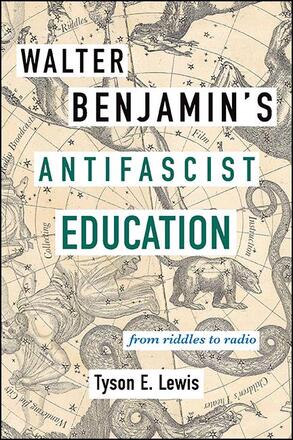
Walter Benjamin's Antifascist Education
From Riddles to Radio
Alternative formats available from:
A comprehensive study of education in the writings of Walter Benjamin.
Description
Walter Benjamin's Antifascist Education is the first comprehensive analysis of educational themes across the entirety of the critical theorist's diverse writings. Starting with Benjamin's early reflections on teaching and learning, Tyson E. Lewis argues that the aesthetic and cultural forms to which Benjamin so often turned—namely, radio broadcasts, children's theatrical productions, collections, cityscapes, public cinemas, and word games—swell with educational potentialities. What emerges from Lewis's reading is a constellational curriculum composed of minor practices such as poor teaching, absentminded learning, and nondurational studying. This curriculum carries political significance, offering an antidote to past and present forms of fascist manipulation, hardness, and coldness. Walter Benjamin's Antifascist Education is a testimony to Benjamin's belief that "everyone is an educator and everyone needs to be educated and everything is education."
Tyson E. Lewis is Professor of Art Education at the University of North Texas. He is the author of several books, including Inoperative Learning: A Radical Rewriting of Educational Potentialities and On Study: Giorgio Agamben and Educational Potentiality.
Reviews
"It is clear that Lewis has succeeded in providing thoughtful and compelling answers to his central questions on a liberating educational philosophy. Drawing on his own extensive scholarship in educational philosophy and his meticulous reading of Benjamin, Lewis provides provocative lessons on what it can mean to foster free expression of students' potentialities and to unravel binaries (such as means and ends), that have stunted the progressive development of educational forms in the context of growing educational authoritarianism." — Theory and Research in Education
"Lewis's clearheaded, illuminating gloss of the antifascist impulse in Walter Benjamin's corpus is instructive and more important than ever." — CHOICE
"Taking up the multifaceted Benjaminian conception of educational life—a life of studious straying and self-reflection at once critical and mimetic—and following its untoward trajectory in object areas as diverse as slapstick film, riddles, cityscapes, and children's theater, this subtle, imaginative, and comprehensive analysis speaks directly to the moral and spiritual crisis of the present." — Howard Eiland, Massachusetts Institute of Technology